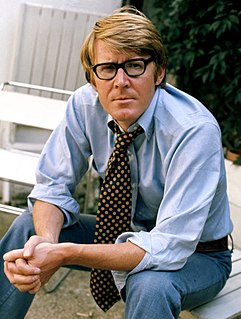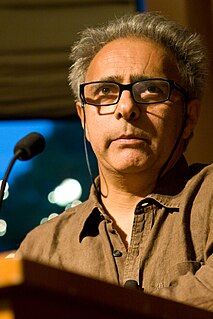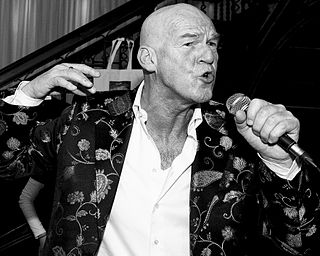
Waiting for Godot is a play by Samuel Beckett, in which two characters, Vladimir (Didi) and Estragon (Gogo), wait for the arrival of someone named Godot who never arrives, and while waiting they engage in a variety of discussions and encounter three other characters. Waiting for Godot is Beckett's translation of his own original French play, En attendant Godot, and is subtitled "a tragicomedy in two acts". The original French text was composed between 9 October 1948 and 29 January 1949. The premiere, directed by Roger Blin, was on 5 January 1953 at the Théâtre de Babylone, Paris. The English language version premiered in London in 1955. In a poll conducted by the British Royal National Theatre in 1990, it was voted the "most significant English language play of the 20th century".

Alan Bennett is an English playwright, screenwriter, actor, and author. He was born in Leeds and attended Oxford University, where he studied history and performed with the Oxford Revue. He stayed to teach and research medieval history at the university for several years. His collaboration as writer and performer with Dudley Moore, Jonathan Miller and Peter Cook in the satirical revue Beyond the Fringe at the 1960 Edinburgh Festival brought him instant fame. He gave up academia, and turned to writing full-time, his first stage play Forty Years On being produced in 1968.

John Nicholas Cassavetes was a Greek-American actor, film director, and screenwriter. Cassavetes was a pioneer of American independent film, writing and directing over a dozen movies, which he partially self-financed, and pioneered the use of improvisation and a cinéma vérité style. He also acted in many Hollywood films, notably Rosemary's Baby (1968) and The Dirty Dozen (1967). He studied acting with Don Richardson, utilizing an alternative technique to method acting which privileged character over traditional narrative. His income from acting made it possible for him to direct his own films independently.

John Boorman, is an English filmmaker who is best known for his feature films such as Point Blank, Hell in the Pacific, Deliverance, Zardoz, Exorcist II: The Heretic, Excalibur, The Emerald Forest, Hope and Glory, The General, The Tailor of Panama and Queen and Country.
Faber and Faber Limited, often abbreviated to Faber, is an independent publishing house in the United Kingdom. Faber has published some of the most well-known literature in the English language, including William Golding's Lord of the Flies. Poet T. S. Eliot was once a Faber editor.

Hanif Kureishi, CBE is a British playwright, screenwriter, filmmaker and novelist of Pakistani and English descent. In 2008, The Times included Kureishi in their list of "The 50 greatest British writers since 1945".
Sir Ronald Harwood, is an African-born British author, playwright and screenwriter. He is most noted for his plays for the British stage as well as the screenplays for The Dresser and The Pianist, for which he won the 2003 Academy Award for Best Adapted Screenplay. He was nominated for the Best Adapted Screenplay Oscar for The Diving Bell and the Butterfly (2007).
Michael Roy Kitchen is an English actor and television producer, best known for his role as Detective Chief Superintendent Christopher Foyle in the ITV drama series Foyle's War 2002-15. He also played the role of Bill Tanner in two James Bond films and John Farrow in BBC Four's comedy series Brian Pern.
John Heilpern, a contributing editor to Vanity Fair and longtime drama critic for the New York Observer,
Roger Lewis is a Welsh academic, biographer and journalist.

Hugh Anthony Glanmore Williams was an English actor, playwright and dramatist of Welsh descent.
Hugo Williams born Hugh Anthony Mordaunt Vyner Williams is a British poet, journalist and travel writer. He was born on 20 February 1942.
Michael Hofmann is a German-born poet who writes in English and a translator of texts from German.
Michael Keith Billington OBE is a British author and arts critic. Drama critic of The Guardian since October 1971, he is "Britain's longest-serving theatre critic" and the author of biographical and critical studies relating to British theatre and the arts. He is the authorised biographer of the playwright Harold Pinter (1930–2008).
William Ash is a British actor. He is known for roles in the television dramas Soldier Soldier, Where the Heart Is (1997–98), Clocking Off (2001–02), Waterloo Road (2009–11) and The Tunnel (2016). His film appearances include Mad About Mambo (2000) and Hush (2008).
Ian Christie is a British film scholar. He has written several books including studies of the works of Michael Powell and Emeric Pressburger, Martin Scorsese and the development of cinema. He is a regular contributor to Sight & Sound magazine and a frequent broadcaster. Christie is Professor of Film and Media History at Birkbeck, University of London.
Events from the year 1980 in Scotland.
Faber is the Latin word for "smith". Like a few other Latin occupational names, it was adopted as a surname in the Low Countries and Germany. It is also common in England, perhaps due to Norman French influence. Notable people with the surname include:









